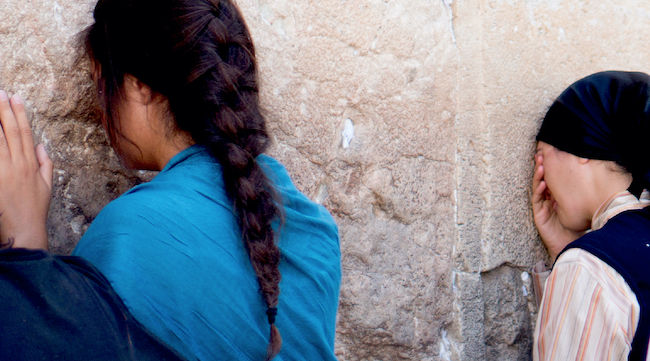
Yitzchok entreated Hashem opposite his wife, because she was barren.[2]
Rivka was barren. So was Soro. And Rochel. And some of the avos. Seems to have run in the family.
Chazal, of course, tell us that HKBH deliberately arranged things this way, because He longs, kivayachol, for the tefillah of tzadikim.[3]
It is a beautiful thought. But it ignores another beautiful observation that Chazal make elsewhere.[4] “The tzadik ordains, and HKBH fulfils.” The avos certainly made the cut as tzadikim. Why, then, were the years of davening necessary? They could have simply demanded, as it were, and achieved results!
The Bnei Yissaschar[5] helps us find the explanation. He cites the Chozeh MiLublin, who says that there is a huge difference between what a person can accomplish through the power of his speech alone, and through the power of tefillah. It is true that Man’s speech has enormous impact, but when speech succeeds in achieving a goal, there is no guarantee that the desired result will have any permanence. Man’s words – like the gezerah of the tzadik – could bring about that a childless couple will have a child – but the gift might be short-lived. When Man’s tefillah moves the Heavens to provide a child, however, the baby that is the answer to the prayer will generally have a firmer footing.
We now understand why the avos and did not simply declare to their spouses, “Let it be that you bear a child!” They were not primarily interested in their own families. They were devoted to the continuity of the Jewish mission. They wanted children assured of long-term existence. Children who would continue to yield progeny till the end of time. This could be accomplished only through tefillah.
It is also apparent what kind of tefillah Hashem was so eager to hear. The fact is that the avos were hardly tyros at davening! They institutionalized it for all their descendants. Yitzchok himself established the mincha prayer – before he ever met Rivka. What Hashem found so special, however, was that their davening was not for their own needs. They davened thinking of the millennia of the Jewish future and the needs of all of Klal Yisrael. This is what Hashem wanted to hear.
People concerned about the illness of a family member are advised by Chazal[6] to “go to a chacham so that the chacham should beseech Hashem’s rachamim.” Interestingly, the gemara does not advise the concerned party to seek out a tzadik to daven on his behalf, but to ask a chacham. Yet it is the tzadik whose edict is adhered to by Hashem Himself! The explanation must be that it takes a chacham to realize that optimally, it is davening that is required. The tzadik might be able to produce short-tern relief, but fervent davening can achieve so much more.
When the Bnei Yisrael found themselves boxed in by the wilderness, the approaching Egyptians, and the Reed Sea, cried out to Hashem in prayer. Hashem told Moshe, “Why call out to me? Speak to the Bnei Yisrael and move on [into the sea].”[7] Why would Hashem chill the ardor of the Bnei Yisrael to daven to Him? Isn’t davening during troubled times something to be encouraged? Doesn’t the Torah actually insist that we increase our prayers during times of need?
The predicament of the Bnei Yisrael, in fact, was a special case. They required relief from the pursuit of the Egyptians, and nothing more! They did not have to think about the longevity of their immediate salvation. They needed to get to the other side, free of the Egyptians. It was a perfect situation for the gezerah of a tzadik, rather than immersion in tefillah. Hashem thus told Moshe, “This is not the time for lengthy davening. Your command will suffice. Speak to the Bnei Yisrael, and give the word: ‘Move forward.’”
What is the essential difference between the (successful) gezerah of the tzadik and tefillah? Why is the latter much more potent? The edict of the tzadik demonstrates the esteem in which he is held in shomayim. It is a reflection of his greatness. Tefillah, however, points to the greatness of Hashem Who listens to the earnest entreaties of His people. It shows His goodness, and His will to do good wherever allowed in.
- Adapted from Be’er Moshe, by the Ozharover Rebbe zt”l ↑
- Bereishis 25:21 ↑
- Yevamos 64a ↑
- E.g Zohar2 15a, in reference to R. Shimon bar Yochai ↑
- Maamarei HaShabbosos 8:16 ↑
- Bava Basra 117a ↑
- Shemos 14:15 ↑


